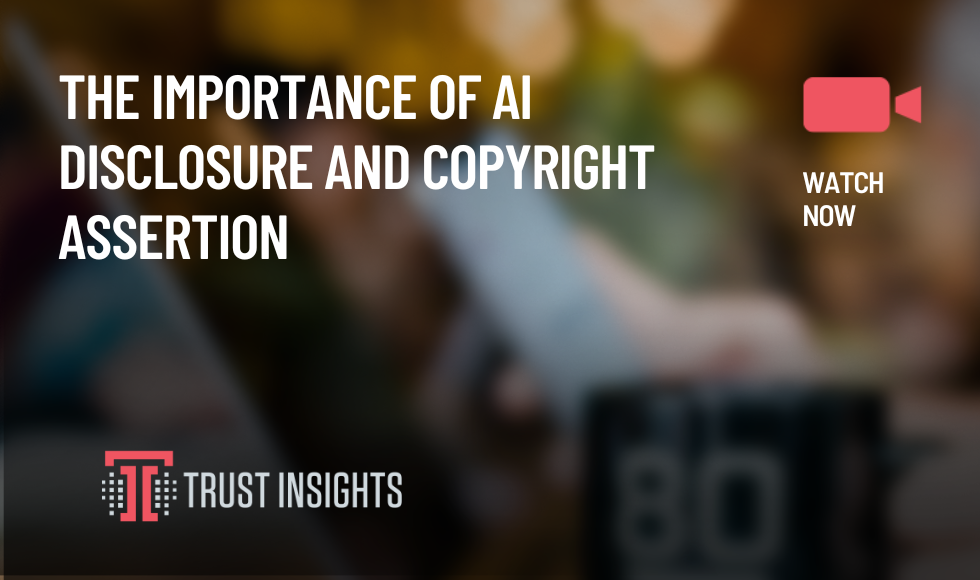Let’s briefly talk about disclosing when you use artificial intelligence (AI) to create content.
Watch the video here:
Can’t see anything? Watch it on YouTube here.
Should you do this? Yes. And there are three reasons why.
First, legality. While it’s not required by law yet in most places, there is a trend headed in that direction, and the first market to require this is the EU. The EU passed the EU AI Act in committee late in 2023 and ambassadors ratified it into law on February 2, 2024. It is now the gold standard planet-wide. Here’s what the European Parliament said:
General purpose and generative AI
Generative AI, like ChatGPT, would have to comply with transparency requirements:
- Disclosing that the content was generated by AI
- Designing the model to prevent it from generating illegal content
- Publishing summaries of copyrighted data used for training
It’s quite clear that these obligations apply to the use of AI – not just the people who make systems, but the people who use them as well. Disclosing the use of AI now gets ahead of the law and ensures you’re compliant – and you don’t have a massive amount of work to do in your back catalog once it does become law. As with GDPR, the EU AI Act applies to any services used by citizens of the EU – regardless of whether you do business there or not.
Second, there are ethical considerations. You shouldn’t claim work you didn’t actually do. For example, if you use AI to write a blog post, you didn’t write the post – a generative AI did. So there’s an ethical responsibility to be transparent, so that your readers know what they’re getting.
Third, there are also legal reasons around copyright to disclose the use of generative AI.
In several court cases, like Naruto v. Slater and the Thaler case, US courts have ruled that AI-generated content cannot be copyrighted. Only human-created works can be protected by copyright. This is the case for a good chunk of the planet.
So if you use AI to create images, text, etc – that content cannot be copyrighted because machine-created content is ineligible for copyright. However, if you have machines do outlines or sketches, and then a human does the final output, as long as humans have generated the final output, it can be protected by copyright.
Here’s why this matters.
If you clearly disclose what content is AI-generated versus human-generated on your site, you reiterate your copyright over the human parts.
For example, say you made a blog post header image with AI but wrote the blog post yourself. The image can’t be copyrighted, but your text can. Now, suppose a competitor comes along and lifts the entire blog post and copies it onto their blog.
Because the image is machine-generated, you have no legal recourse to prevent them from doing so. However, they likely assumed that because the image was AI-made, so was the content – and that’s not the case. If you carefully disclose that only the image is AI-made, then you can assert your copyright over the human-made text.
That’s why AI disclosure is so important – because by disclosing what is AI-made, you are also protecting what is NOT AI-made.
This also applies to freelancers and agencies you hire. Ensure they disclose any AI use so you don’t falsely claim copyright on AI-generated content.
So, to recap. Disclose the use of AI for three reasons.
- It’s going to be legally required soon in many places.
- It’s ethically the right thing to do.
- It reiterates your copyright over the non-AI generated content you publish.
Disclosure and transparency can increase trust and can reduce risk, so if you haven’t already, start disclosing the use of AI in your content today.
And if you have more questions about how to use AI in marketing, check out our Generative AI for Marketers course at trustinsights.ai/aicourse
And disclosure/disclaimer of our own: we are not lawyers or attorneys, and we cannot give legal advice. Work with a qualified attorney in your jurisdiction to obtain legal advice specific to your situation.
|
Need help with your marketing AI and analytics? |
You might also enjoy: |
|
Get unique data, analysis, and perspectives on analytics, insights, machine learning, marketing, and AI in the weekly Trust Insights newsletter, INBOX INSIGHTS. Subscribe now for free; new issues every Wednesday! |
Want to learn more about data, analytics, and insights? Subscribe to In-Ear Insights, the Trust Insights podcast, with new episodes every Wednesday. |







Thank you for the interesting overview on a very hot topic. I am wondering if one uses AI to help draft initial text and or images both of which the ‘author’ / ‘creator’ subsequently edits / amends etc using their own skills and expertise – am I correct to understand the resultant completed work is protected by copyright and does not require the AI creation disclosure you outlined?
Many thanks,